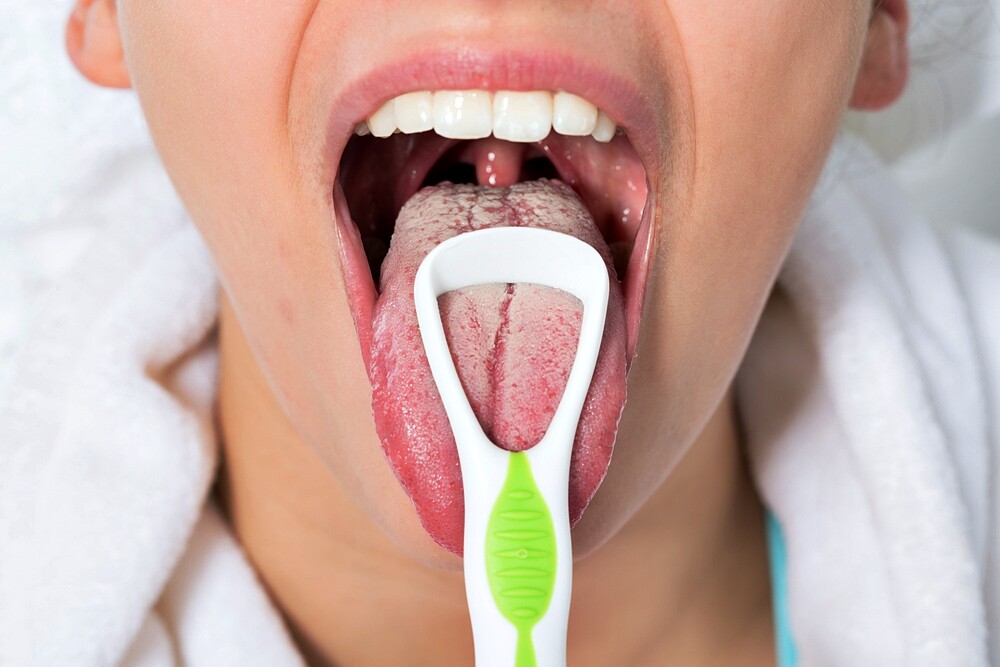Each of us has probably had a coating on the tongue. You can find out here when it is harmless and when you better go to the doctor.
Introduction
Tongue coating is basically nothing unusual at first. It is often formed during the course of the day by food or bacteria. However, this is not harmful to your health. With regular oral hygiene and chewing the food, the coating on the tongue will go away.
However, if the coating on your tongue remains in your mouth for days, it is a sign of a disease that you should have your doctor check up on. We will now tell you which coating on the tongue has which causes.
Common causes
- Poor oral hygiene
- Fever, flu
- Infections such as scarlet fever (red raspberry tongue), typhoid or diphtheria
- Food (especially soft, liquid food)
- Heavy consumption of coffee, alcohol, milk or tea
- Fungal disease (oral thrush) in the mouth and on the tongue
- Gastroenteritis
Coated tongue
Coated tongue can appear in completely different ways. Often it is harmless and occurs, for example, due to certain foods or the consumption of cigarettes, coffee or red wine, which can stain the tongue in different colours.
White tongue
White coating on the tongue is widespread and often a result of food remnants or dead cells. A coated tongue is also often one of the symptoms of colds. Digestive problems can also be one of the causes of coating on the tongue.
However, it can also be diseases such as typhoid, lichen ruber planus or leukoplakia. In the case of iron deficiency, on the other hand, the tongue tends to look pale.
Yellow tongue
The yellow coating on the tongue is fortunately mostly harmless. The following reasons are possible causes:
- Nicotine from smoking stains on the tongue
- Oral hygiene is not good
- Nutrition
- Gastritis or fungal infection (oral thrush)
- Syphilis or diphtheria
Black/brown tongue
- The black coating is often the result of a diet containing colouring foods such as coffee or tobacco. Regular use of mouthwash or medication can also cause the plaque.
- It is also possible that the thread papillae change. These papillae become longer and act like fine black hairs on the tongue. The black effect can be further intensified by food residues and bacteria.
- A brown coating on the tongue can also be caused by intestinal diseases or problems with the kidneys.
Red tongue
When the coating on the tongue is red, we also speak of the so-called raspberry tongue. The cause is often scarlet fever. The red tongue usually only comes into play when a previously existing coating has dissolved.
Tongue burning
Especially in women, the coating on the tongue can come from the so-called tongue burning. The front part of the tongue is particularly affected. Causes for tongue burning can be infections, allergies or medication, stress and psychological problems, but also dental problems. Whether the burning sensation, which is often accompanied by a coating on the tongue, is only occasional or permanent, depends on the individual.
Coated tongue: Visit to the doctor
If you do not feel any fever, tongue burning or other illnesses, you do not need to see a doctor immediately due to coating on the tongue. Wait a few days and try to help yourself with the recommended home remedies.
If you do go to the doctor, the symptoms of the tongue are usually associated with other diseases, such as sore throat or fever. The doctor will take a smear of the coating on your tongue to identify the cause of the disease. If the coating on the tongue has its causes in the mouth, the dentist is also an option for further treatment.
Home remedies
- Salt: Salt is an effective household remedy for plaque on the tongue. Mix one teaspoon of salt in a glass with lukewarm water. Then rinse the salt peeling in your mouth for a short time without swallowing it.
- Oil: Olive oil removes bacteria and is therefore useful for coatings on the tongue. Take a little of the oil in your mouth and let it work for about 10 minutes. Then rinse the mouth with water. By the way, oil helps with bad breath, plaque on the tongue and also with plaque on the teeth.
- Baking powder: Take half a teaspoon of baking powder in a glass of lukewarm water and rinse your mouth with it. Baking powder neutralizes acids. Then rinse the mouth with water.

